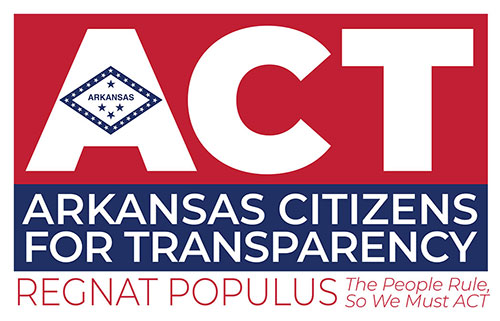
What do The Arkansas Government Disclosure Amendment
and Act of 2024 actually do?
Here is a summary of each and links to the full text.
The Constitutional Amendment:
- Establishes the right of the citizens of Arkansas to government transparency.
- Enshrines in the Arkansas State Constitution the definition of “government transparency” as the government’s obligation to share information with citizens or deliver information to citizens.
- Restricts the circumstances under which the General Assembly may make a law concerning government transparency.
- The General Assembly may only propose a law concerning government transparency by referring a bill adopted by a two-thirds majority vote of both the House and the Senate to be determined by the citizens at the next general election.
- Confirms that the state may be sued for failure to comply with transparency law.
The Initiated Act:
- Repeals Arkansas Code § 6-13-619(e), as amended by Act 883 of 2023, concerning the ability of a school board, superintendent, and attorney to meet secretly.
- Defines the terms “cybersecurity”, “government transparency”, “minority party”, and “public notice.”
- Exempts from FOIA any portion of a personnel record and any portion of a public record which would constitute a clearly unwarranted invasion of the personal privacy of a person either living or deceased, or if the disclosure of the record is not related to the performance of the public official, or if the information is of a personal nature the privacy of which outweighs the public’s interest in disclosure.
- Amends Arkansas Code § 25-19-105(c)(3)(B)(i) to include electronic mail (email) as a means of contact for notification if public records are exempt from disclosure.
- Establishes the deadline for access to public records as the end of the third working day following the date the request is received by the custodian of the records, and the process for ensuring compliance with FOIA if that three-day deadline cannot reasonably be met.
- Requires a public meeting to be conducted in a manner that allows the public to attend and hear the governing body’s meaningful discussion and deliberation of official business.
- Requires notice of regular meetings to be published online and provided to anyone requesting notice at least 48 hours prior to the meeting, and notification of special meetings be provided and published online at least two hours prior to the special meeting.
- Amends Arkansas Code § 25-19-106 to include a definition of “public meeting.”
- A “public meeting” includes without limitation communication between two or more voting or non-voting members of a governing body for the purpose of exercising a responsibility, authority, power or duty of the governing body on any matter on which o cial action will foreseeably be taken, and a series of two or more formal or information communications made between an agent, employee or person who is paid by funds subject to the control of the governing body and one or more members of the governing body, used to poll the votes of the members of the body or solicit support or opposition from the members of the body and concerning any matter on which official action will foreseeably be taken.
- Two or more employees of a governing body may communicate for the purpose of exercising a responsibility, authority, power or duty of an employee without notice and an open meeting under this section.
- Addresses expenses and penalties available in an appeal from a denial of rights guaranteed under FOIA
- Establishes conditions for disclosure of a public record related to security.
- Clarifies and strengthens disclosure policies for records related to security of government officials.
- Establishes the Arkansas Government Transparency Commission and outlines its membership, role, and powers.
- The Arkansas Government Transparency Commission is created on or after July 1, 2025, and will consist of five members: one each appointed by the Speaker of the House, the President Pro Tempore of the Senate and the minority leader of the Senate, the minority leader of the House of Representatives and the Lieutenant Governor of the State of Arkansas.
- The role of the commission is to assist Arkansas citizens in accessing public records and public meetings, and enforcing government compliance with the law concerning a citizen’s rights to government transparency.
